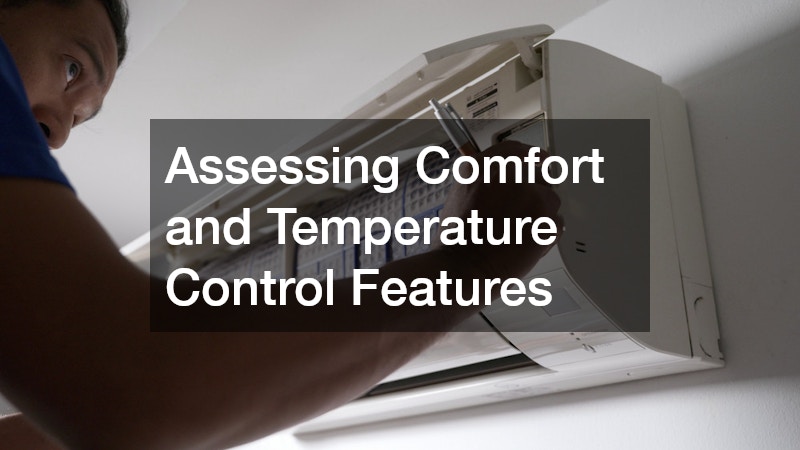Choosing the right heating system for your home is a major decision that affects both comfort and cost for years to come. Whether you’re upgrading an existing system or installing one in a new home, the choice between a standard HVAC setup and propane heating can feel overwhelming. Each option has its own advantages in terms of efficiency, environmental impact, and maintenance requirements. The best choice often depends on factors like your home’s size, local climate, energy prices, and personal heating preferences. By understanding how these systems work and comparing their long-term performance, homeowners can make an informed decision that balances comfort, cost savings, and sustainability.
Understanding the Basics of Home Heating Options
Before comparing specific systems, it’s helpful to understand what differentiates standard HVAC systems from propane heating. A traditional HVAC system typically uses electricity to power both heating and cooling components, offering year-round climate control. Propane heating, on the other hand, relies on stored fuel to generate heat efficiently and quickly, even in extremely cold conditions. The main difference lies in energy source and distribution—HVAC systems often involve heat pumps or electric furnaces, while propane systems depend on combustion to produce warmth. Knowing how each system operates gives you a clearer picture of what best suits your household’s energy needs.
If you’re considering propane as your home’s primary heat source, a professional residential propane installation can ensure the system is set up safely and efficiently. During installation, technicians assess your home’s layout, determine the appropriate tank size, and connect the system to your heating appliances. Propane systems are versatile and can also fuel stoves, water heaters, and fireplaces, making them a comprehensive home energy solution. Proper installation not only maximizes performance but also ensures safety and compliance with local regulations. By starting with a professional setup, homeowners can enjoy reliable heat and long-term comfort.
Comparing the Efficiency of Propane and Traditional HVAC Systems
Energy efficiency is one of the most important factors to consider when choosing between a standard HVAC system and propane heating. While electric HVAC units can be effective in moderate climates, they may struggle to maintain efficiency in very cold conditions. Heat pumps, for example, lose effectiveness as outdoor temperatures drop, forcing them to use more electricity to maintain comfort. Propane heating, in contrast, delivers steady and powerful heat regardless of the weather. Because propane burns cleanly and produces high energy output, it can often warm a home faster and more efficiently than some electric systems.
To determine which system performs best for your home, consult professionals who specialize in propane services to evaluate your energy consumption patterns and potential savings. They can help calculate efficiency ratings, estimate annual fuel use, and compare costs between propane and electricity in your area. These experts can also assess whether your home’s insulation, size, and ventilation support one system better than the other. Propane heating can be particularly advantageous in rural areas where electric infrastructure may be limited or costly. By analyzing both performance and local energy prices, you can make a decision that aligns with your household’s comfort goals and budget.
Evaluating Fuel Availability and Storage Needs
Fuel access and storage are major factors when choosing between a standard HVAC system and propane heating. Traditional HVAC systems are powered by electricity, which is readily available in most areas, while propane requires regular fuel deliveries and on-site storage. Homeowners in rural regions often find propane more reliable since it’s not affected by power outages, but storage logistics must be considered. Propane offers flexibility in energy management, allowing you to purchase fuel in bulk when prices are lower and store it safely for later use. On the other hand, electric systems provide convenience without the need for refueling or storage space.
If you decide that propane heating fits your household needs, installing local propane tanks is essential for ensuring consistent performance. These tanks are available in various sizes and can be installed above or below ground depending on your property layout and aesthetic preferences. Local providers can deliver fuel regularly and inspect tanks for leaks or corrosion, keeping your system safe and efficient. Proper tank installation also ensures compliance with local codes and optimal placement for accessibility. By planning ahead and working with experienced professionals, you can maintain a steady fuel supply without disruption during the coldest months.
Weighing the Environmental Impact of Each Heating Method
Sustainability is an increasingly important consideration for homeowners choosing between heating systems. Electric HVAC systems may seem like the cleaner option since they don’t burn fuel directly, but their true environmental impact depends on how the electricity is generated. If your electricity comes from renewable sources, such as solar or wind power, your system will have a smaller carbon footprint. However, if your region’s power grid relies heavily on coal or natural gas, propane may actually be the greener option. Propane burns cleaner than many other fossil fuels, producing fewer greenhouse gas emissions and minimal soot.
To better understand your heating system’s environmental performance, professionals who specialize in propane gas tanks can explain how modern propane technology aligns with sustainability goals. Many propane appliances have high-efficiency ratings and low emission levels, making them a responsible choice for eco-conscious homeowners. Additionally, propane systems produce virtually no toxic emissions that harm indoor air quality, making them a safe and sustainable solution for families. By comparing local energy sources and evaluating efficiency ratings, you can select the system that balances comfort with environmental responsibility.
Considering Installation and Maintenance Requirements
Installation complexity and long-term maintenance are also critical factors when deciding between a standard HVAC system and propane heating. A conventional HVAC system may require ductwork, heat pumps, or furnace connections, depending on the setup, while propane systems involve tanks, regulators, and fuel lines. Both options demand professional installation to ensure safety and efficiency. Maintenance schedules differ as well—HVAC systems typically need seasonal inspections for filters, coils, and refrigerant, whereas propane systems require periodic checks for leaks and proper fuel combustion. Evaluating these differences can help you determine which system better suits your household’s maintenance capacity and budget.
Professionals who work with propane systems can ensure your setup is properly installed and maintained over time. They inspect lines, clean burners, and verify that tanks and valves are operating safely. Regular service extends equipment lifespan, prevents performance issues, and keeps your heating system running efficiently. Additionally, propane maintenance is often straightforward and less frequent than expected, particularly when performed by certified technicians. By factoring in installation and upkeep needs early, homeowners can make an informed decision that prioritizes safety, reliability, and convenience.
Estimating Long-Term Costs and Energy Savings
When comparing heating options, it’s important to think beyond the initial installation and consider long-term expenses. Energy prices fluctuate over time, so what seems cost-effective today might change in a few years. A standard HVAC system typically relies on electricity, which can be more expensive in certain regions, while propane systems use stored fuel that can be purchased strategically when prices drop. Propane often produces more heat per unit than electricity, which can make it a more efficient option for cold climates. Evaluating your local energy rates, average winter temperatures, and household heating needs will give you a clearer picture of the long-term cost differences between the two systems.
Working with a local propane service provider can help you estimate your potential savings and develop a cost plan that fits your budget. They can provide insight into seasonal propane pricing, delivery schedules, and maintenance fees, giving you a realistic view of what to expect. These professionals can also compare your current electricity usage with projected propane consumption to determine which option delivers better energy efficiency. In some cases, homeowners discover that propane heating offers both lower annual costs and more consistent comfort during harsh winters. A well-planned propane system can deliver long-term savings while maintaining high performance and reliability.
Assessing Comfort and Temperature Control Features
Comfort is a major deciding factor when choosing between propane heating and a standard HVAC system. Electric systems often provide consistent, even heat, but they can struggle in extremely cold weather, especially in regions that experience freezing temperatures. Propane systems, however, generate high-intensity heat quickly, making them ideal for homeowners who prefer a warm, responsive system. Propane furnaces also tend to produce warmer air than electric heat pumps, creating a cozier indoor atmosphere. The choice often comes down to whether you value steady, moderate warmth or rapid, powerful heat during colder seasons.
To ensure optimal performance and comfort, professional heating and air conditioning services can evaluate your home’s layout, insulation, and energy efficiency. They can help you decide whether propane or a standard HVAC system will provide more consistent heating for your space. These experts can also integrate zoning systems, thermostats, and air quality controls to enhance comfort and efficiency year-round. Working with trained technicians ensures your system operates smoothly, adapts to your lifestyle, and maintains balanced temperatures in every room. The result is a comfortable home environment tailored to your family’s needs and preferences.
Consulting Experienced Technicians for Guidance
Choosing between two heating systems can feel complex, especially when you’re weighing technical details, costs, and long-term performance. Consulting professionals with hands-on experience can make the decision much easier. Technicians understand the strengths and weaknesses of both propane and electric systems and can guide you through installation options, maintenance expectations, and energy efficiency ratings. Their input helps ensure that you choose the right solution for your home’s unique layout and climate. Relying on expert advice also reduces the risk of installation errors and costly inefficiencies down the road.
Certified HVAC contractors are particularly valuable when you’re exploring new heating options. They can assess your current system, recommend upgrades, and calculate how each option will affect your monthly energy bills. These contractors also stay up to date with building codes and safety standards, ensuring that your installation complies with all local requirements. In many cases, HVAC professionals can design hybrid systems that combine the best features of propane and electric heating for maximum efficiency. Working with experienced contractors helps you make an informed, confident choice that aligns with your comfort goals and long-term budget.
Reviewing Safety and Performance Standards
Safety is one of the most critical factors to evaluate when deciding between a standard HVAC system and propane heating. Both options are safe when properly installed and maintained, but each has unique safety considerations. Electric HVAC systems require regular inspections to ensure that wiring and circuits are functioning correctly, while propane systems rely on airtight fuel lines, secure storage, and adequate ventilation. Propane heating is extremely safe when managed by professionals, but neglecting maintenance or allowing leaks can pose risks. By understanding and following proper safety protocols, homeowners can confidently enjoy either system without concern.
If you’re leaning toward a propane-based setup, experienced furnace contractors can verify that all components meet safety standards and operate efficiently. They’ll inspect gas lines, check pressure levels, and ensure your furnace’s ignition system functions correctly. Many contractors also offer carbon monoxide testing and ventilation checks to maintain optimal indoor air quality. These extra precautions ensure your home remains safe while maximizing the lifespan and performance of your equipment. Choosing qualified professionals for safety inspections gives you peace of mind that your system is reliable, compliant, and ready to handle seasonal heating demands.
Making the Final Choice for Your Home’s Efficiency
After evaluating all the major factors—cost, comfort, energy efficiency, maintenance, and safety—it’s time to decide which system best fits your home. For many households, the right choice depends on regional climate and available energy sources. Standard HVAC systems may offer convenience and simplicity, especially in areas with mild winters and affordable electricity rates. In contrast, propane systems provide powerful, reliable heat and independence from the electrical grid, which can be beneficial during outages or in rural areas. Weighing both the short-term and long-term implications of each option will help ensure your investment aligns with your household’s comfort and budget goals.
For a comprehensive decision, consult established HVAC companies that specialize in both propane and electric systems. These experts can compare installation costs, performance metrics, and estimated annual expenses side by side. They may also recommend hybrid systems that integrate the efficiency of electricity with the reliability of propane heating. By working with a company that offers both options, you gain balanced, unbiased advice based on data—not sales incentives. The goal is to select a system that delivers consistent comfort, long-term savings, and dependable performance tailored to your home’s needs.
Deciding between a standard HVAC system and propane heating is a major investment in your home’s comfort, safety, and efficiency. Each option has its benefits—electric systems are convenient, low-maintenance, and environmentally friendly when powered by renewables, while propane systems offer powerful heat, reliability, and independence from the grid. The key to making the right choice lies in understanding your home’s heating requirements, energy costs, and long-term priorities. Factors such as fuel availability, maintenance expectations, and environmental impact should all guide your final decision.
Homeowners who take the time to compare systems carefully often find that both propane and HVAC technology can deliver comfort when properly installed and maintained. Partnering with qualified technicians, assessing local energy conditions, and calculating potential savings are all crucial steps in the decision-making process. No matter which system you choose, investing in professional installation and ongoing service ensures safety, performance, and peace of mind. With thoughtful planning and expert guidance, you can select a heating solution that keeps your home warm, efficient, and comfortable for years to come.




